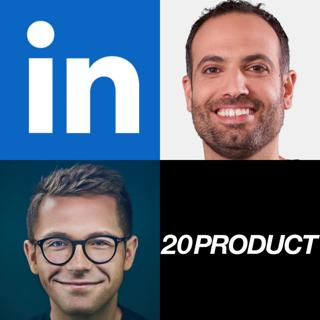
20Product: How Linkedin Does Product Reviews, A Post-Mortem on Stories, Linkedin Messenger and Spam & Why the Data Advantage in AI is Diminishing with Tomer Cohen, CPO @ Linkedin
Tomer Cohen is the CPO @ Linkedin. Since joining in 2012, Tomer has served in key leadership roles, helping launch and scale new innovative member and customer experiences. He previously led the growth and development of LinkedIn's Marketing Solutions portfolio and LinkedIn's consumer and mobile products. Prior to LinkedIn, Tomer worked as an entrepreneur with Greylock Partners and founded a company in the personal CRM space. In Today's Episode with Tomer Cohen We Discuss: 1.) From Israeli Military and Chip Design to CPO @ Linkedin: How did Tomer make his way from the Israeli military to being CPO @ Linkedin? What does Tomer know now that he wishes he had known when he became CPO? What have been some of his biggest lessons from working with Reid Hoffman? 2.) Product: Art or Science: How does Tomer determine whether product is art or science? If he were to put a number on it, what would it be? How does Tomer determine whether to go with his gut vs go with the data on product decisions? How is AI changing the role of product managers and product leaders? What do product leaders and PMs need to do to stay up to date with the latest changes in AI? 3.) Linkedin: Review of Current Products: Feed, Stories, Messenger How does Tomer analyse the success of "the feed" in Linkedin? What worked? What did not work? Why did "Stories" not work in Linkedin? What went wrong? What did they learn? What is Tomer doing to tackle the spam issue in Linkedin? What are the biggest challenges associated? Why does Linkedin still have such poor messaging service? Why is it a difficult problem to solve for? 4.) AI Changes Everything: Why does Tomer believe this wave of AI is the most significant technological shift in our lifetime? Who will win the race in AI; startups or incumbents? Which model will work most efficiently; open or closed? Will we see large enterprises prefer bundled AI options or unbundled with specialised providers?
26 Touko 202345min
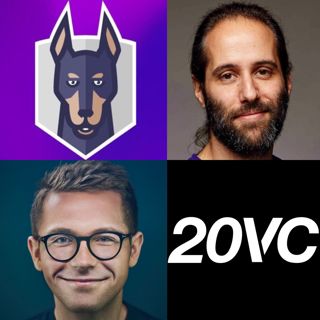
20VC: Why Being First To Market Does Not Matter, Why You Do Not Have Defensibility on Day 1, How to Analyse Market Size and Present it to Investors, Vitamins vs Painkillers; Do Vitamins Survive Recessions and Good vs Great Messaging with Guy Podjarny @ Sn
Guy Podjarny is the Founder of Snyk, the leading Developer Security platform, helping developers secure as they build. Guy was previously CTO at Akamai, co-founded Blaze.io (acquired by Akamai), and was the product manager of AppScan, the first AppSec scanner, through Sanctum, Watchfire and IBM. Guy is a public speaker, O'Reilly author, and an active early stage angel investor. In Today's Episode with Guy Podjarny We Discuss: 1.) From Israeli Military to Founding a $10BN Company: How Guy made his way into the world of startups from the Israeli military? What is Guy running away from? Why does he hate tribalism so much? Does Guy believe serial entrepreneurship is valuable or naivety of young founders is good? 2.) The Secret to Finding Product Market Fit: Why does Guy believe PMF is a poorly defined term? How does Guy define PMF? What are the single biggest mistakes founders make while searching for PMF? What are the most important elements on messaging when it comes to PMF? If you have a horizontal tool, how do you message and resonate with specific audiences? 3.) Defensibility and Being First to Market: Does Guy believe that being the first to market is really that valuable? Does Guy agree that investors expecting defensibility on day 1 is wrong? Why does Guy think market leadership is way more important than first to market? What are the true defensible moats that can be built early today? 4.) Lessons from 100 Angel Investments: What have been the single biggest lessons for Guy from his 100 angel investments? What are the biggest mistakes angels make when investing today? How should founders present their market size to investors? Where do they go wrong? Does Guy invest in both painkiller and vitamin businesses? How does he compare them? Why is Boldstart Guy's favorite venture capital firm?
24 Touko 202358min
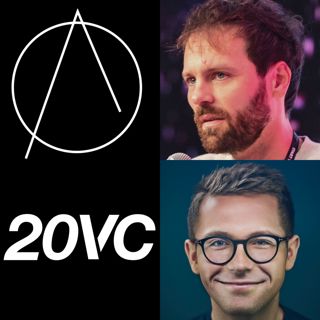
20VC: Why Your Fund Model Should Not Rely on $10BN+ Outcomes, Why the Large Funds Got Too Large, The Rise of Solo GP's; The Pros and Cons & Is Consumer Subscription Even a Good Sector to Invest in with Nico Wittenborn @ Adjacent
Nico Wittenborn is the Founder of Adjacent, one of the best early-stage firms created over the last 5 years. Before starting Adjacent, Nico spent over 3 years at Insight Partners in New York and before that learned the craft of venture from some of the best in early-stage, Point Nine, where he spent over 4 years. Nico's portfolio across funds includes the likes of Revolut, Chainalysis, Oura, RevenueCat and PhotoRoom to name a few. In Today's Show with Nico Wittenborn We Discuss: 1.) From Selling Mobile Phones to Leading Early-Stage Investor: How did Nico first make his way into the world of venture with Point Nine? What did Nico learn from his time with Point Nine and Insight? How did his time at each impact how he invests and runs Adjacent today? What does Nico know now that he wishes he had known when he started investing? 2.) Is Consumer Subscription Even a Good Place to Invest? With Calm ($2BN) and Duolingo ($6BN) as the market leaders and there only being two of them, is consumer subscription even a good place to invest? How does Nico pushback that retention for consumer subscription apps is so bad? What do many not see about consumer subscription retention numbers? How does Nico respond to the challenge of high customer acquisition cost and navigating challenging platform shifts in advertising, when investing in consumer subscription? What will the consumer subscription landscape look like in 5 years time? 3.) Adjacent: The Fund, The Strategy: Why does Nico believe if your fund model relies on $10BN outcomes, you are in trouble? How large is the latest Adjacent fund? What does the portfolio construction look like for the fund? How much diversification is the right level of diversification? How many companies per fund? How does Nico think about capital concentration on a per company basis? What are Nico's ownership requirements? How have they changed with funds? What is it about Nico's structure which enables him to be more collaborative than others? 4.) Nico: The Investor: Lessons: How does Nico reflect on his own relationship to price? When does he pay up? When does he not? What has been one of Nico's biggest misses? How has that changed his approach? Why does Nico not really compete with the large multi-stage funds? Why is Nico deliberately trying to reduce the amount of companies that he sees? 5.) The Future of Venture: How does Nico analyze the rise of solo GPs? What are the biggest pros and cons of the model? Why does Nico believe the large generalist funds are in trouble? Who is set to win and who is set to lose in the next 10 years of venture? Which seed firm would Nico invest in? Which Series A firm? Which growth firm?
22 Touko 20231h 6min
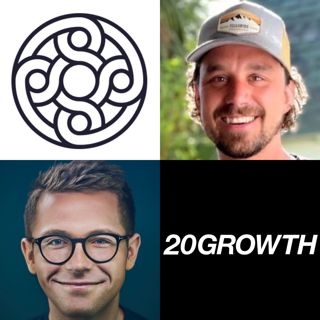
20Growth: Three Growth Lessons Scaling Whatsapp from 0-100M, Why You Should Hire a Head of Growth Sooner Than You Think & The Biggest Mistakes Founders Make When Hiring for Growth with Ryan Wiggins, Head of Growth @ Mercury
Ryan Wiggins is the VP of Growth and Analytics at Mercury where he oversees a Growth team and founded the Analytics function. Prior to this, Ryan built Growth teams at WhatsApp, where he helped grow WhatsApp Business from 0->100M users, Workplace, and Facebook Ads. If that was not enough, Ryan is also an active angel investor. In Today's Episode with Ryan Wiggins We Discuss: 1.) From US Department of Commerce to Leading Growth Teams: How Ryan made his initial foray into the world of growth with Facebook and Whatsapp? What does Ryan know now that he wishes he had known when he made the entry into growth? What advice does Ryan have for people who want to change their career but are not sure what they want to do? 2. ) Who and When: Building the Team: Should we hire a Head of Growth or a more junior growth hire first? What are the different profiles of growth hires? How do they change with business model? When is the right time to hire your first growth hire? What are the single biggest mistakes founders make on the timing of growth hires? 3.) How to Hire: The Process: Structurally, what is the right way to hire for a growth team? What does the interview process look like? What do you want to get out of each meeting? Should case studies be used, if so, should they be used for the company hiring or of the company where the candidate is from? What does the comp package look like for different growth hires? Who should be brought into the growth hiring process? What stage should they be involved? 4.) Onboarding: Setting Growth Up for Success: What is the ideal first 30,60 and 90 days for new growth hires? What can leaders do to ensure they are set up for the maximum chance of success? What are three of the biggest red flags bad growth hires show in the first 30 days? What are the biggest mistakes founders make in the onboarding process of growth hires?
19 Touko 202347min
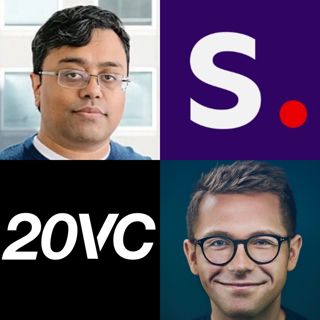
20VC: Why the AI Bubble Will Be Bigger Than The Dot Com Bubble, Why AI Will Have a Bigger Impact Than COVID, Why No Models Used Today Will Be Used in a Year, Why All Models are Biased and How AI Kills Traditional Media with Emad Mostaque, Founder & CEO @
Emad Mostaque is the Co-Founder and CEO @ StabilityAI, the parent company of Stable Diffusion. Stability are building the foundation to activate humanity's potential. To date, Emad has raised over $110M with Stability with the latest round reportedly pricing the company at $4BN. Investors include Coatue, Lightspeed, Sound Ventures, OSS Capital and Airstreet Capital, to name a few. Prior to Stability, Emad was in the world of hedge funds, that was until his son was diagnosed with autism and he left to make a difference in the space and help find treatments and solutions. In Today's Episode with Emad Mostaque We Discuss: 1.) From Hedge Funds to Finding Treatments for Autism to Leading the World of AI: How Emad made his way from the world of hedge funds to founding one of the leading AI companies of our time? How did Emad find a solution to parts of his son's autism with a $6 drug? How does Emad believe we can use AI to solve the majority of medical problems today? What does the future of healthcare look like with AI at the centre? 2.) Models: What is Real? What is False? Why no models today will be used in a year? Why all models are biased and how do we solve for it? Why hallucinations are a feature and not a bug? Why the size of your model does not matter anymore? Why will there be national models specified to cultures and nations? How is this implemented? 3.) Who Wins: Startups or Incumbents: Why does Emad believe there will only be 5 really important AI companies? Which will they be? How does Emad review Google's AI strategy following their news last week? Was their integration of Google and Deepmind recently a success? How does Emad assess Meta's AI strategy? Why does Zuckerberg now acknowledge the metaverse play was a mistake? How does Emad evaluate the approach taken by Amazon? Why are they the dark horse in the race? What can startups do to get a meaningful edge on the large incumbents? How do they compete with their distribution? 4.) The Next 12 Months: What Happens: Why does Emad believe the .ai bubble will be bigger than the dot com bubble? Why does Emad believe that the biggest companies built-in AI in the next 12 months will be services-based companies? How does the ecosystem look if this is the case? Why will India and emerging markets embrace AI faster than anyone else? What happens to economies that have large segments reliant on freelance work that AI replaces? Why will we see the death of many large content publishers and media companies? What does Emad mean when he says we will see the rise of "AI first publishers"? 5.) Open or Closed: What Wins: Why does Emad believe we must be open by default? Why does open win? Why does Emad side with Elon and believe we must pause the development of AI for 6 months? How does Emad evaluate the leaked memo from Google stating that neither Google nor OpenAI are ahead? What does this mean for the AI ecosystem? Where will the best AI talent concentrate? What do companies need to do to win the best talent?
17 Touko 20231h 6min
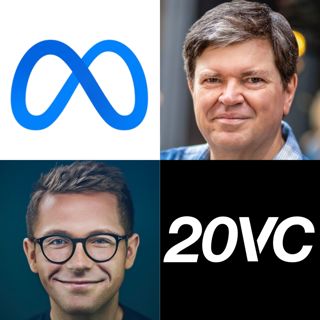
20VC: Yann LeCun on Why Artificial Intelligence Will Not Dominate Humanity, Why No Economists Believe All Jobs Will Be Replaced by AI, Why the Size of Models Matters Less and Less & Why Open Models Beat Closed Models
Yann LeCun is VP & Chief AI Scientist at Meta and Silver Professor at NYU affiliated with the Courant Institute of Mathematical Sciences & the Center for Data Science. He was the founding Director of FAIR and of the NYU Center for Data Science. After a postdoc in Toronto he joined AT&T Bell Labs in 1988, and AT&T Labs in 1996 as Head of Image Processing Research. He joined NYU as a professor in 2003 and Meta/Facebook in 2013. He is the recipient of the 2018 ACM Turing Award for "conceptual and engineering breakthroughs that have made deep neural networks a critical component of computing". Huge thanks to David Marcus for helping to make this happen. In Today's Episode with Yann LeCun: 1.) The Road to AI OG: How did Yann first hear about machine learning and make his foray into the world of AI? For 10 years plus, machine learning was in the shadows, how did Yan not get discouraged when the world did not appreciate the power of AI and ML? What does Yann know now that he wishes he had known when he started his career in machine learning? 2.) The Next Five Years of AI: Hope or Horror: Why does Yann believe it is nonsense that AI is dangerous? Why does Yann think it is crazy to assume that AI will even want to dominate humans? Why does Yann believe digital assistants will rule the world? If digital assistants do rule the world, what interface wins? Search? Chat? What happens to Google when digital assistants rule the world? 3.) Will Anyone Have Jobs in a World of AI: From speaking to many economists, why does Yann state "no economist thinks AI will replace jobs"? What jobs does Yann expect to be created in the next generation of the AI economy? What jobs does Yann believe are under more immediate threat/impact? Why does Yann expect the speed of transition to be much slower than people anticipate? Why does Yann believe Elon Musk is wrong to ask for the pausing of AI developments? 4.) Open or Closed: Who Wins: Why does Yann know that the open model will beat the closed model? Why is it superior for knowledge gathering and idea generation? What are some core historical precedents that have proved this to be true? What did Yann make of the leaked Google Memo last week? 5.) Startup vs Incumbent: Who Wins: Who does Yann believe will win the next 5 years of AI; startups or incumbents? How important are large models to winning in the next 12 months? In what ways does regulation and legal stop incumbents? How has he seen this at Meta? Has his role at Meta ever stopped him from being impartial? How does Yan deal with that?
15 Touko 202354min
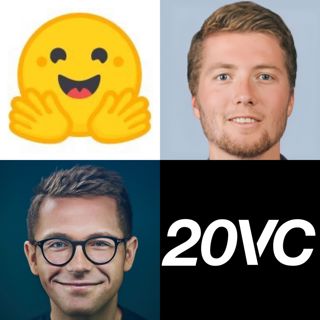
20VC: Why The Future of AI Is Open Not Closed, Why We Are Years Away From AI Being Autonomous, Why AI Founders Do Not Need to Move to the Valley & Why Founders Should Not Meet Investors in Between Rounds with Clem Delangue @ Hugging Face
Clem Delangue is the Co-Founder and CEO @ Hugging Face, the AI community building the future. To date, Clem has raised over $160M from the likes of Sequoia, Coatue, Addition and Lux Capital to name a few. Prior to Hugging Face, Clem was in product and marketing at two different startups both of which were acquired. In Today's Episode with Clem Delangue: 1. From Tamagotchi to Leading the World of AI: How did a Tamagotchi startup turn into one of the hottest AI startups in the world? What does Clem know now that he wishes he had known when he started? What are Clem's biggest pieces of advice to founders on pivoting? 2. AI: Trend or Transformation: To what extent does Clem believe the current hype in AI is justified? What is overblown? What have been some true and groundbreaking developments? How far away does Clem believe AGI is? What is a massive misconception the public has that Clem wishes he could change? 3. Open vs Closed: Which Model Wins: Why does Clem believe the future of AI will be won by open-source? What is his reasoning to suggest closed is fundamentally a weaker model? Does Clem acknowledge that in the short term, enterprises will buy from a closed model with greater ease? How does he plan to tackle this? 4. Regulation: What Happens Now: What regulatory changes need to be made in the world of AI most urgently? Is Elon Musk right to suggest the immediate pausing of developments in AI? What does Clem believe to be the most likely scenario to AI regulation in the next 12 months? 5. Fundraising: Lessons and Reflection on Raising $160M: Do AI startups fundamentally cost more money than normal startups to build? Why does Clem not meet investors in between rounds? What does Clem believe is the most helpful thing an investor can do? What are Clem's spiciest takes on venture as a financing model?
12 Touko 202347min

20Sales: How to Scale a Career While Scaling a Family, Strategies and Specific Tools To Help Maintain Work-Life Balance, What Companies Can Do To Empower Parents To Be Their Best Selves & How to Prevent Parental Leave Being an Inhibitor To Your Career
Today's 20Sales is a special Mother's Day edition where we are joined by 6 of the best sales leaders who also happen to be rockstar mothers. The Profiles Maggie Hott is on the GTM Team (Go-To-Market) at OpenAI. Before OpenAI, Maggie was Director of Sales @ Webflow and before Webflow spent an incredible 6 years at Slack. Stevie Case is the CRO @ Vanta. Prior to Vanta, Stevie spent an immensely successful 6 years at Twilio as VP of Mid-Market Sales. Renu Gupta is an advisor and sales consultant to some of the fastest-growing SaaS companies today. Previously she has held sales leadership roles at Slack, Thrive and Dropbox. Lauren Schwartz is the VP Enterprise Sales @ Fivetran. Before Fivetran, Lauren spent 4 years at Segment as Senior Director of Enterprise Sales leading to their acquisition by Twilio. Julie Maresca is the Head of Global Accounts at Atlassian. Prior to Atlassian, Julie spent an immensely successful 6 years at Slack in numerous roles including Head of Enterprise Sales for North America. Jessica Arnold is the VP of Global Sales Development @ Amplitude. Before Amplitude, Jessica was the Senior Director for Inside Sales North America at Dropbox for close to 6 years. In Today's 20Sales Mothers Day Episode We Discuss: 1.) How have you navigated growing in your career at the same time, growing your family? 2.) How do you balance your career and being a mother - when do you lean in and out? 3.) What are some specific strategies or tools that have helped you maintain a work-life balance? 4.) How do you prioritize your mental health and wellbeing while juggling your responsibilities at work and at home? 5.) How do you handle the guilt that many working mothers experience when they have to focus on their career? 6.) What are the unique challenges and advantages of being a mother in a sales leadership role? 7.) How has your experience as a mother influenced your leadership style and decision-making? 8.) How have you navigated going out on maternity leave without it having an impact on your career? 9.) America has one of the worst parental leaves of any country in the world. How can you advocate for parental leave if the existing policy isn't up to par? 10.) What are some ways that companies can create a more inclusive and supportive environment for working mothers in sales leadership roles?
10 Touko 20231h 5min






















